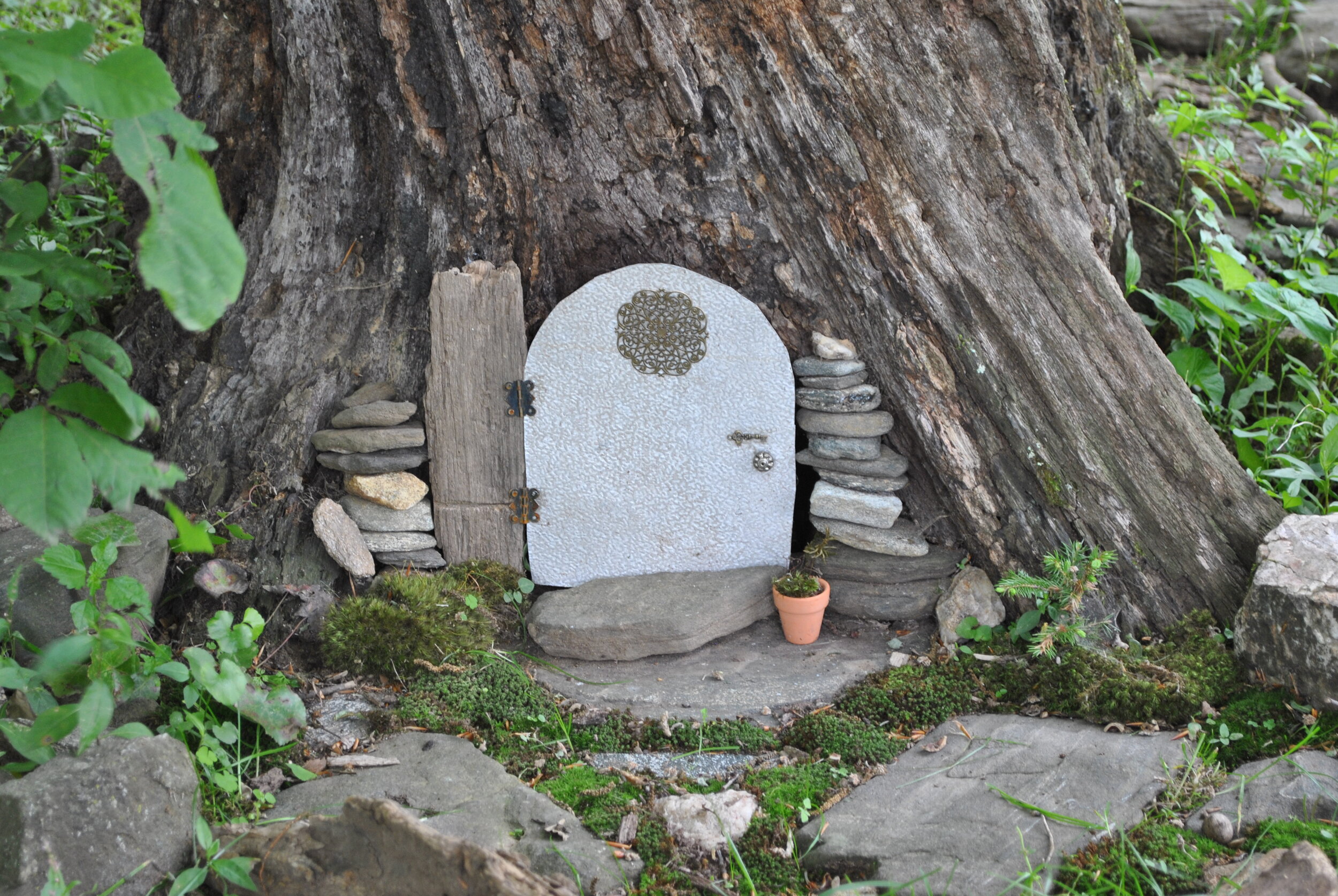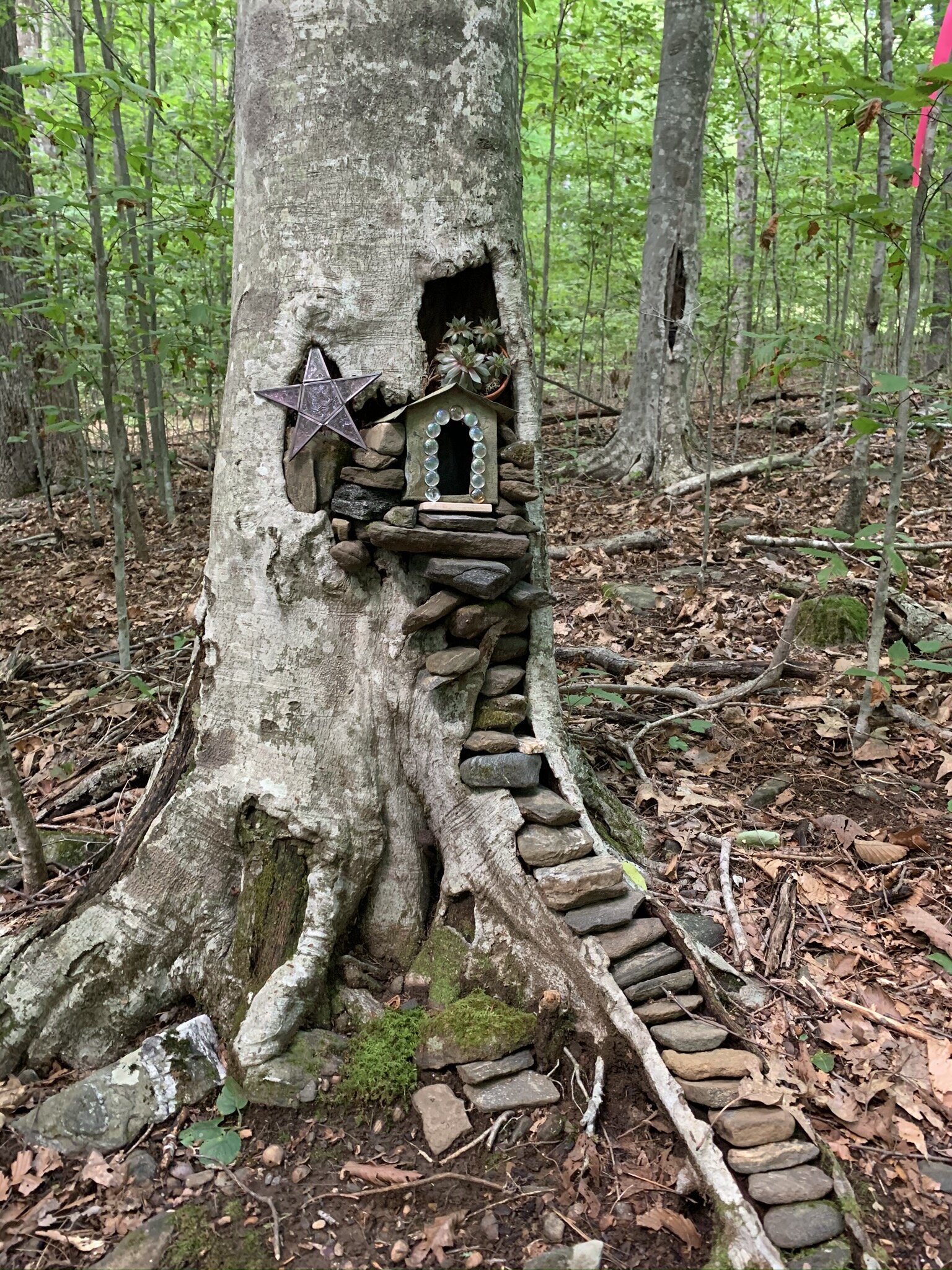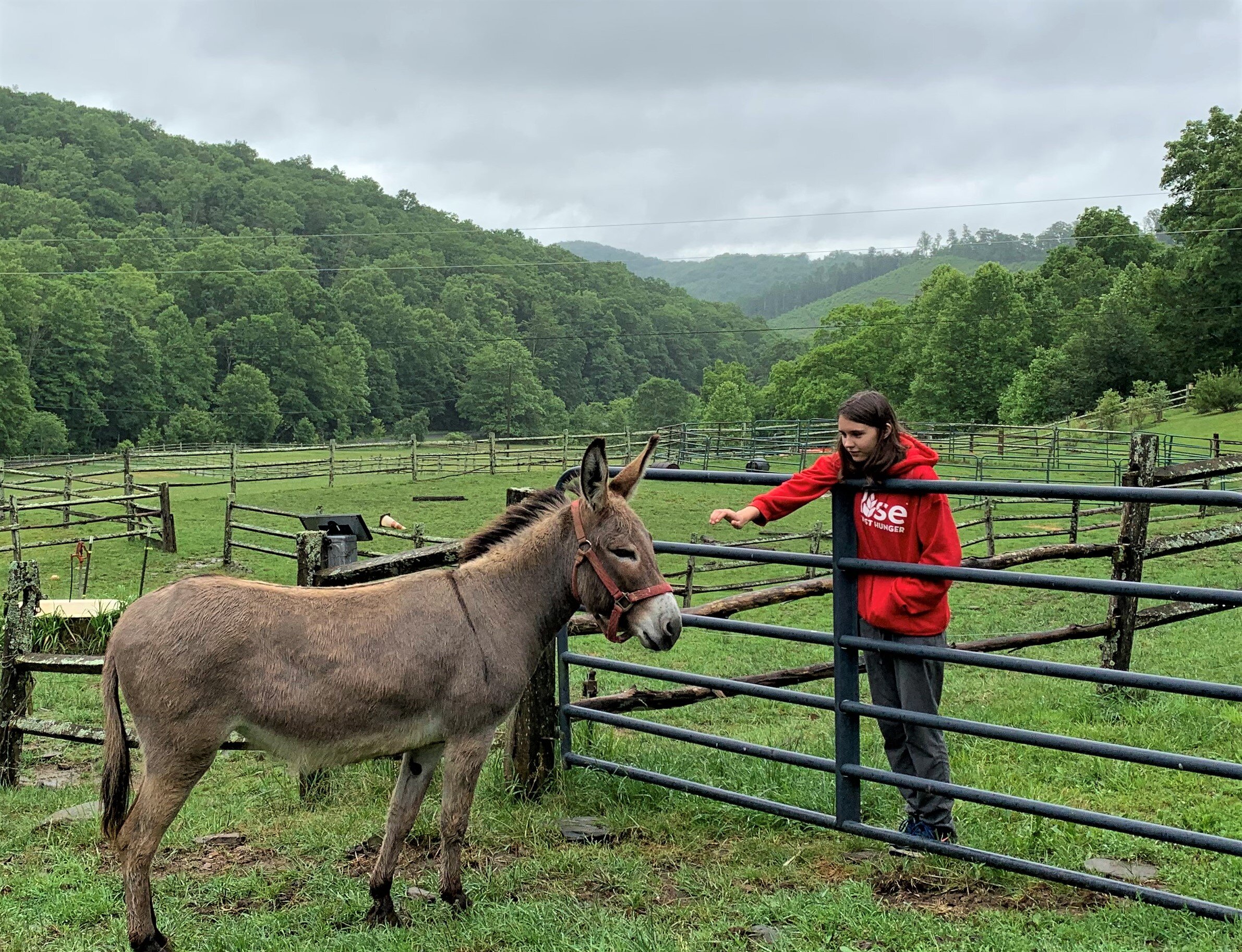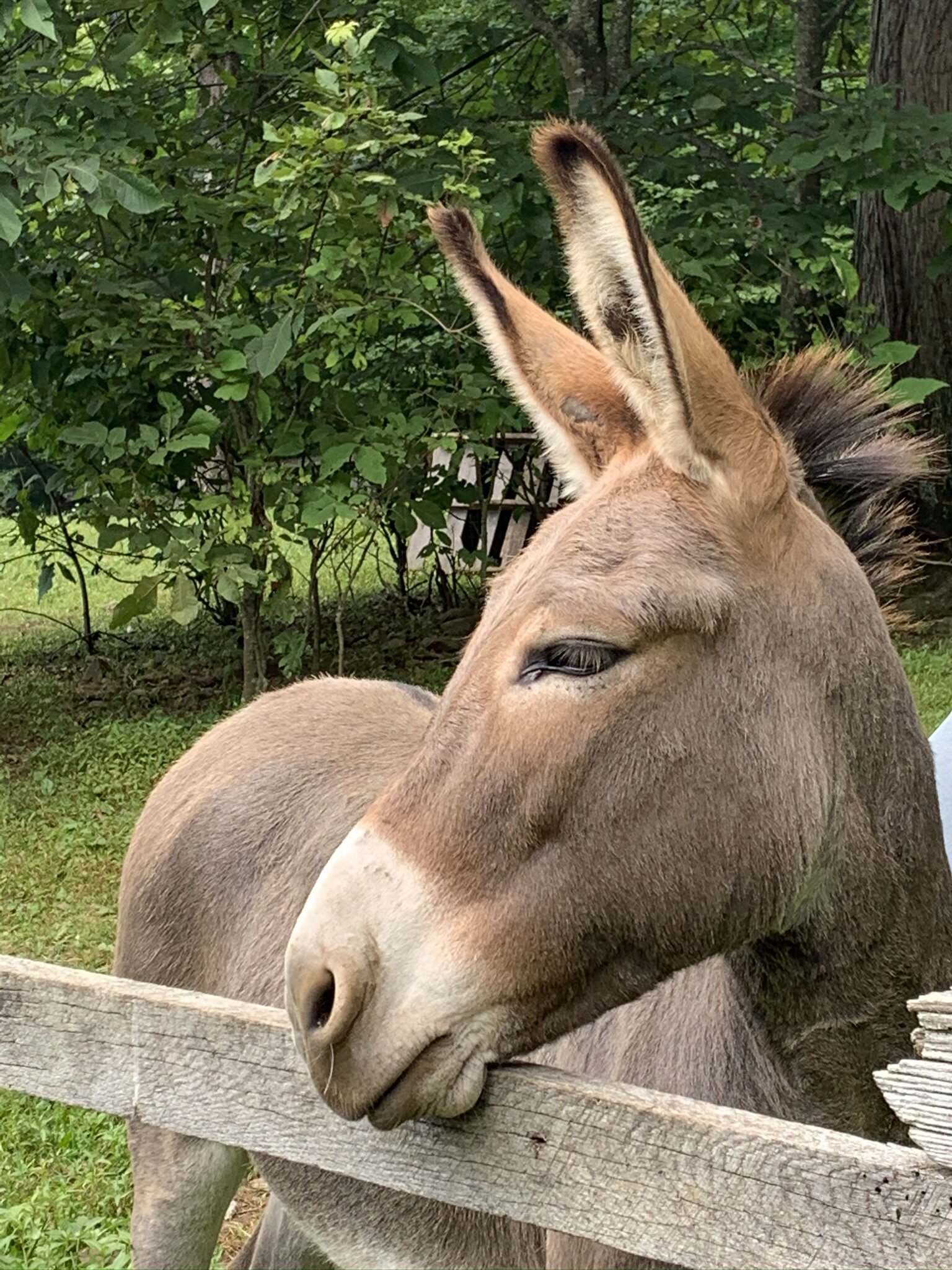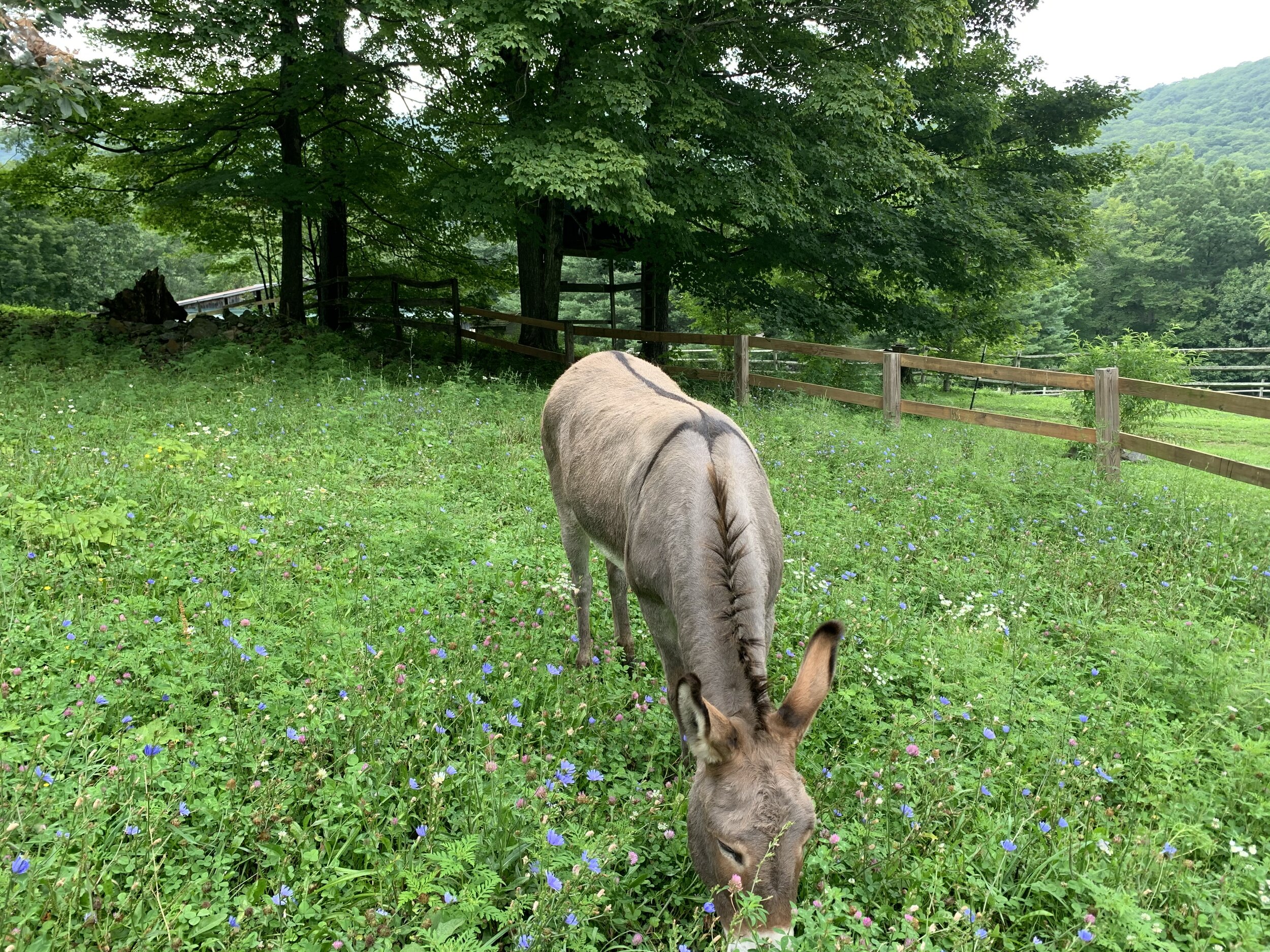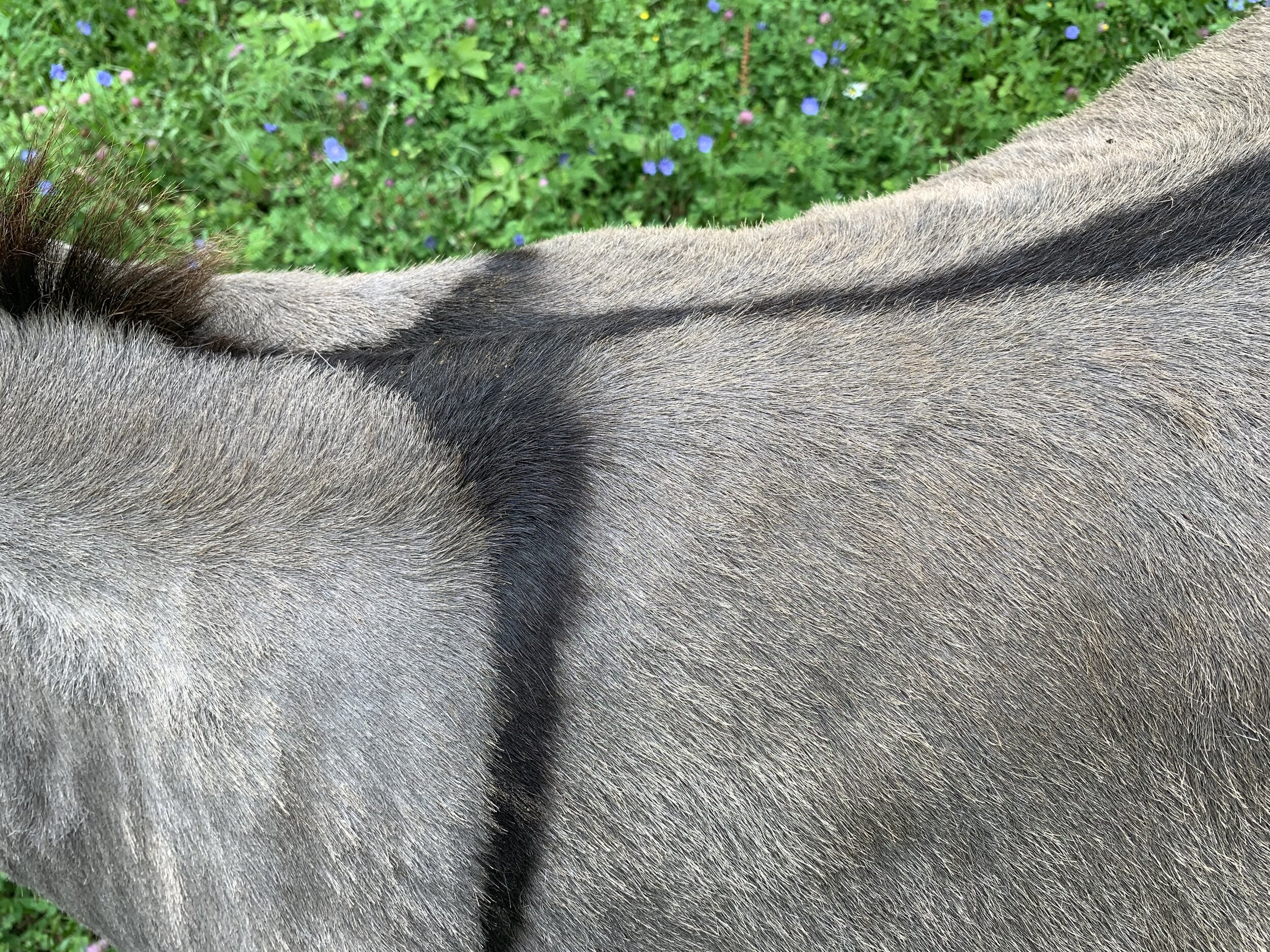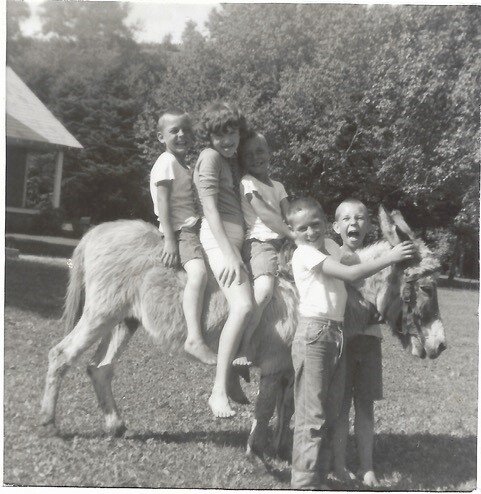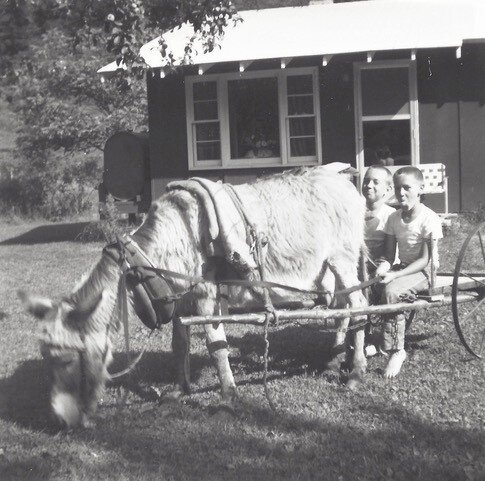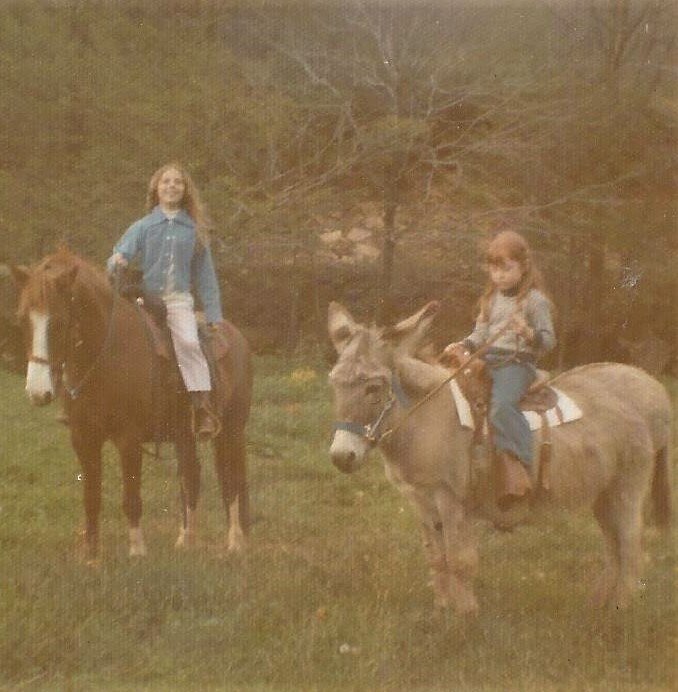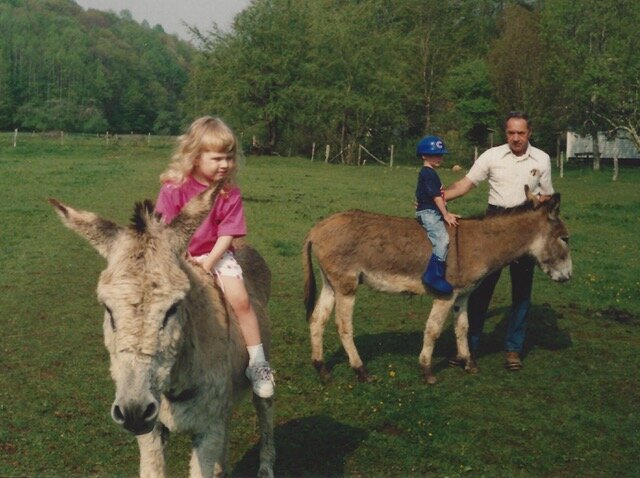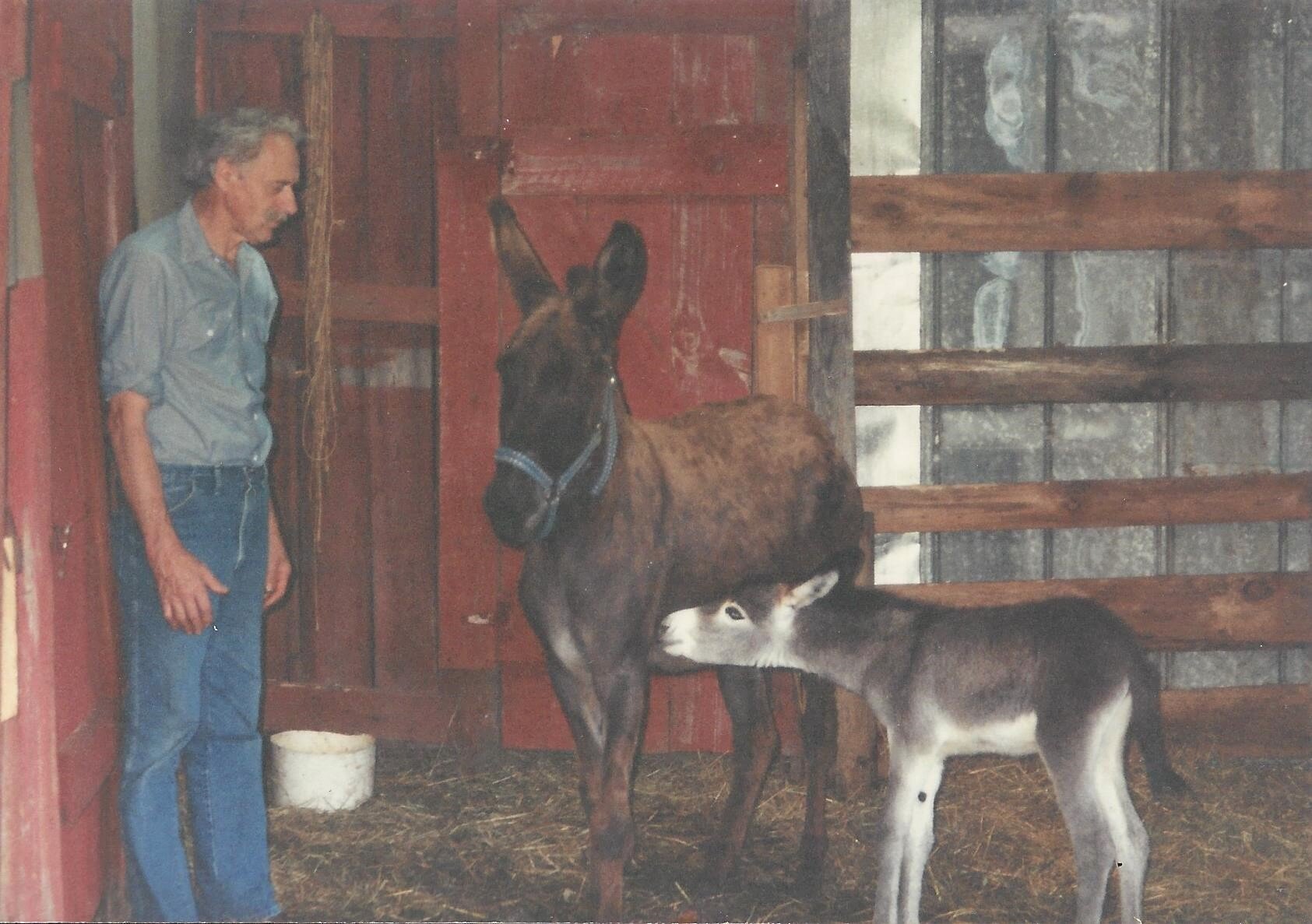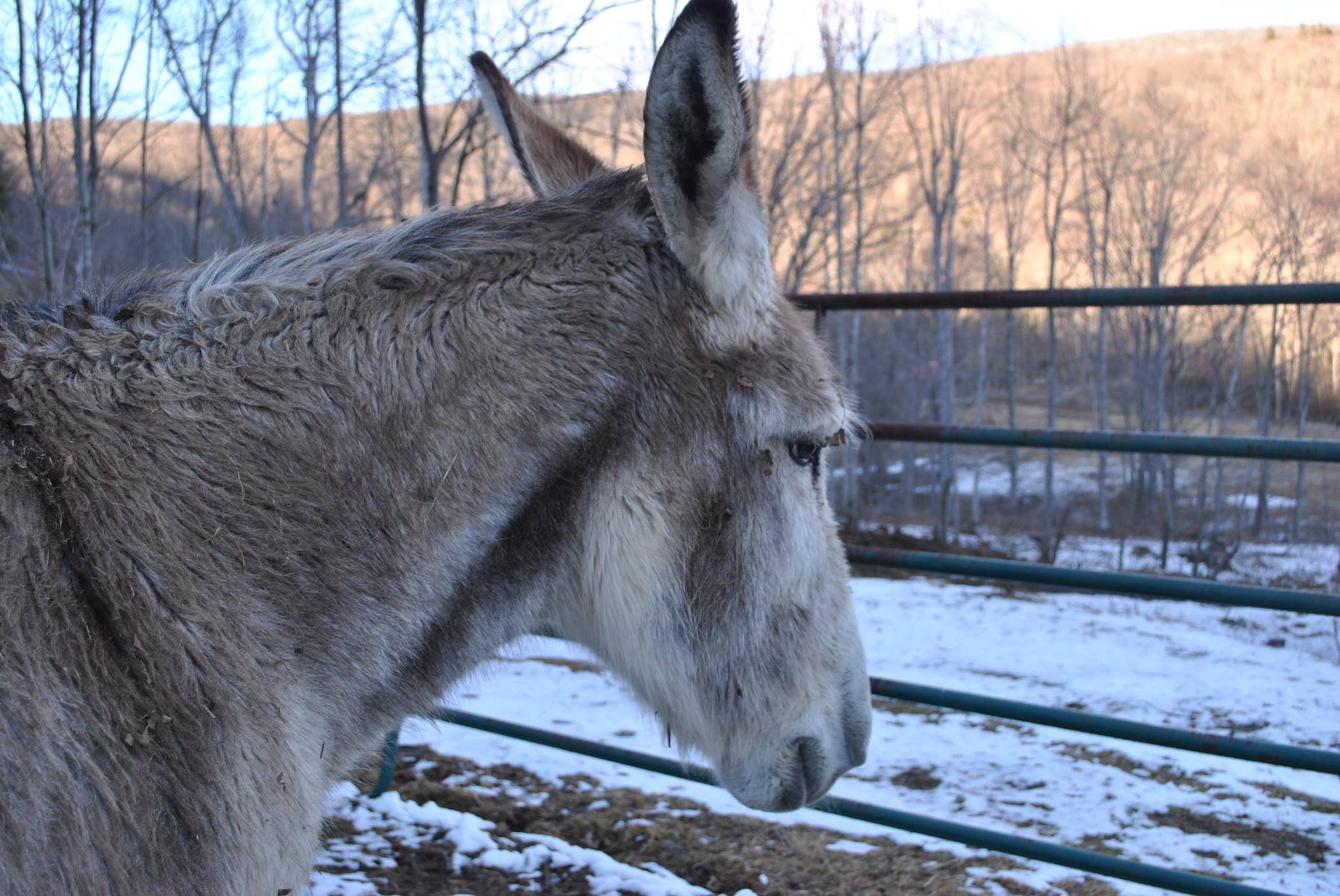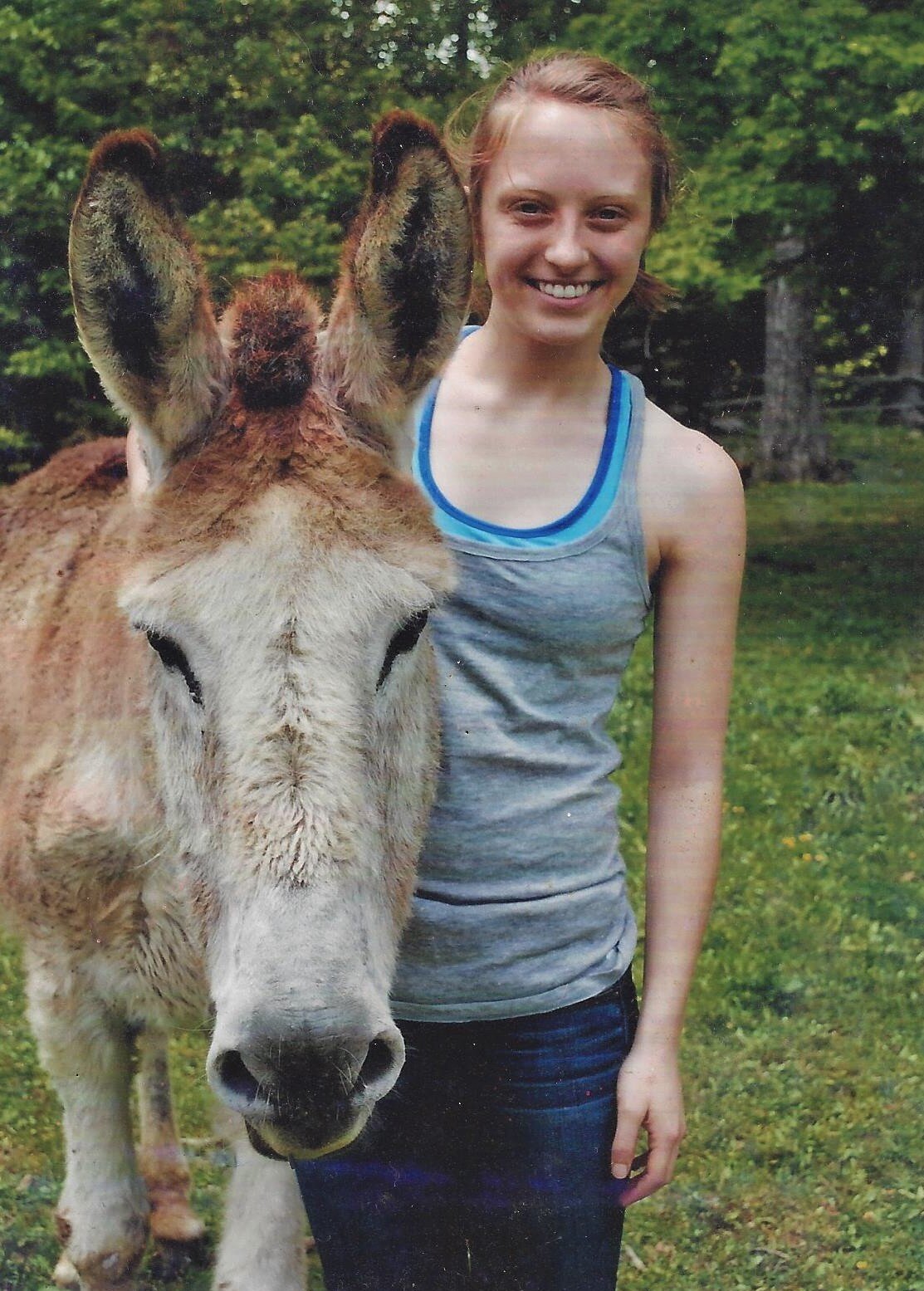By Betty Miller Conway
Penelope got out the other day. After frantically searching for her all over the pasture, I finally found her on the other side of the fence in the fairy forest, standing peacefully among the tiny doors and houses like a big, long-eared garden statue. “Does Penelope think she is a fairy?” I wondered. I couldn’t help but laugh. Penelope was not amused; instead she stared at me as though I were an intruder in her space. When I attempted to approach her, she became coy—tossing her floppy ears, switching her tail, staying just out of reach, and giving me that determined donkey look that said, “I’m in charge—I’ll go back when it suits me.”
If there is anything I have learned over the years on the farm, it is that it’s hard to strongarm donkeys into doing anything. It’s far easier to convince them that your idea is their idea. Then they become agreeable. So I went back to the barn to get a bucket of treats and give Penelope time to think about where her needs would best be met--in the fairy forest which, while beautiful and magical, offered little in regard to food, water, and back scratches-- or back in her own little enclosure with lots of grass, a cozy little barn, and sweet little farm guests eager to share their candy with her.
It did not take Penelope long to decide to follow me and my bucket of treats down the fairy path back into her own enclave. Of course, she did so on her own terms: three feet back and without letting me put a halter and lead rope on her. But overall, it was a good compromise. We both got what we wanted, and no one got hurt which is a good thing in any situation.
I have always had an affinity for donkeys. I admire their steadfast determination, their patience, and their humble demeanor. I love how their big floppy ears prick forward and the way they are interested in everything. And who could not adore a big loud donkey bray? If you have never heard one, be warned that it does not sound like the advertised He Haw; rather it is more like the combination of a foghorn and someone gasping for breath in some cheap horror movie. (Did I mention that maybe loving a donkey’s bray is an acquired taste, not for the faint of heart?)
Donkeys play an important role in Aesop’s Fables, Cervantes’s Don Quixote, and even Shakespeare’s plays. Of course, who could forget the intrepid donkey in Shrek? Sometimes, people think that donkeys are mules, but in actuality, mules are a cross between a female horse and a male donkey (also called a jack) and are unable to produce offspring of their own. Donkeys, on the other hand, are part of an ancient past that makes them related to the zebra. That’s why they have dorsal markings that go down their back and across their shoulders. Legend has it that these primitive markings are the shadow of the cross since the donkey was the last creature to kneel before the cross when Jesus was crucified. I don’t think that’s in the Bible anywhere, but the Bible does affirm that a donkey carried Jesus to Jerusalem on Palm Sunday, and biblical scholars presume that a donkey carried Mary to Bethlehem since donkeys were widely used as a means of transportation back then.
Over the years I’ve known a fair number of donkeys. Back when my cousins and I were young, my uncle had a donkey named Jocko. Stories abound about Jocko who was somewhat of a neighborhood celebrity. Jocko knew how to pull a cart and that made him a big hit with the neighborhood children since he was gentle, furry, and could pull them around on Chestnut Grove Road. Plus, Jocko always sported a very smart haircut. Debbie and Joan, my older cousins who lived next door, tried to put a plastic lawn chair on him once and pretend they were riding an elephant at the circus. From what I understand, that did not go well at all. Joan also remembers how one time she put me on Jocko in front of her and rode off to visit a neighbor up the road. We made it there without incident but at some point, Jocko decided to go home before I was put back on him, and there was no stopping him. Joan recalls that she could hear me screaming for a good half mile (I never did like being left behind!). I don’t remember any of this since I was only three or four, but clearly someone must have gone back and retrieved me.
Later, I had my own donkey named Lady. She was a big pet and deemed safe enough for a child to ride. When only eight years old, I could put my pony saddle on her and ride off alone, anytime I felt like it. Or rather whenever Lady felt like it! Lady was a placid donkey, but when she got tired and decided it was time to go home, that’s what she did—just like Jocko. I could pull on her and yell “whoa” as much as I wanted, but it didn’t matter. She didn’t exactly run away; really it was more like a walk away toward home. Thankfully, she never left me behind.
To our utter delight, Lady eventually had a baby donkey who was all long ears and spindly legs. My little sister, Ann, named her Bunny, and we thought she was the dearest creature ever. On long summer evenings, my father would let the donkeys into the yard to graze, and we would brush Bunny’s soft fuzzy coat and put ribbons in her spiky mane. Ann was given the task of teaching Bunny to wear a halter and to walk politely on a lead rope. I’m not sure who was more determined at first as they pulled each other all over the yard, but in the end, my little sister prevailed, and Bunny learned to follow along nicely. I’m sure Ann must have found a way to convince Bunny that it was all the little donkey’s idea in the first place. Lady never minded sharing her baby and was extraordinarily patient with all of us, baby donkey and children alike. Ann also learned to ride her. Eventually, I graduated from riding Lady and was able to ride on my own horse. Blaze was fast and exciting, and I discovered that I would rather ride horses than do just about anything. But I’ll never forget Lady and her patient personality.
Even after Jocko, Lady, and Bunny moved on, my uncle kept a little herd of donkeys in the field beside our house off and on for years. These donkeys were not required to work in any way; really, they were just big pets. Lloyd liked to look at them and give them treats. He fed them apples from my grandfather’s old orchard, and he could tell you which donkey preferred June apples, and which ones opted for Grime’s Gold, York Imperials, or Jonathans. In late summer, though, I think all of them brayed for the sweet, pale yellow Transparents from the oldest tree in the orchard.
My daughters first encountered donkeys in that field. They and their cousins thought of them as big furry bunnies, and they, too, liked to give them apples. My dad and uncle helped them ride a little bit. In the end, I think they preferred interacting with donkeys while their own feet were firmly on the ground. Like the rest of us, they learned quickly that donkeys generally don’t mind if you sit on their backs if you don’t mind going where they are going anyhow.
Eventually, I moved to my own farm, and a kind neighbor gave me a donkey. We named him Solomon because he looked wise and thoughtful like the biblical King Solomon. And after knowing the old long-eared guy for a while, I decided that he was kingly, too. He was the sweetest donkey ever. He would come up to you and gently bury his head in your stomach in hopes that you would scratch his long ears. He loved peppermints. He was so docile that I could sit under him and attend to the endless medical issues that he had. I spent more time bathing and rubbing ointment on that old donkey than I did on all our expensive horses combined. But I didn’t mind. He was the epitome of patience and humility.
But Solomon had his own understanding of order on the farm. He did not like change and was ready to charge any new intruder in his space. That included dogs, coyotes, racoons, and once, even me on my handy-dandy hydrostatic mower as I was zipping around his pasture. He was the only creature on the farm that Heidi, our dog, respected and did not attempt to dominate. And he welcomed all visitors with a loud raucous bray. Like a dog, he was especially loud when he saw the UPS or FedEx truck spin up the driveway. We always knew when a package was delivered! We had him fifteen years and after he was gone, I felt as though he could never be replaced.
Then came Penelope. For a couple of years, I had refused to even consider another donkey on the farm. After all, what creature-- even one with long fuzzy ears-- could possibly take the place of sweet old Solomon? But just this summer, a neighbor convinced me to come visit Penelope at her farm. I quickly decided that she was the most beautiful donkey I had ever seen, and I fell in love with her intense stare and long eyelashes. They brought her to Willet Ponds the next day.
Penelope certainly has not taken the place of Solomon, but she has earned her own place. She is young, feisty, and inquisitive. She had never had a halter on before we got her, and she did not like to have her ears touched. These are issues that we are still working on. But overall, she has adjusted to our farm with typical donkey aplomb. She has made herself right at home. She loves the children who visit and pet her. She likes me pretty well, too, especially when I have a feed bucket in my hand!
Like Solomon she is very persnickety about what she allows in her pasture. Humans of all assorted sizes and types are welcomed, including the tiny ones who run around erratically, making loud, high-pitched noises. The squawking, flamboyant peacocks are allowed, even when they are strutting and fanning their indigo blue tails all around. The chickens and turkeys who swarm around her legs and feet at feeding time are also tolerated – unless they fight with each other, in which case she promptly breaks it up by sticking her head between them. Coyotes, dogs, and other potential predators in any shape or form are clearly forbidden, and we recently saw Penelope even chase one of our domestic bunnies out of her pasture with a surprising burst of speed. Thank goodness Penelope has become best friends with our pig, Josephine. That’s an extraordinarily wonderful thing since Josephine is far too fat to ever outrun a donkey.
Apparently, Penelope likes fairies as well. Otherwise I presume that she wouldn’t linger in their magical forest when she could be eating grass elsewhere. I imagine that perhaps those long ears enable her to hear fairies fluttering in the trees and laughing with the breeze. Or maybe she just likes the cool path with the leaves making sunlit patterns on the forest floor. I see her standing in her pasture staring wistfully over the fence at the little path, and I wonder what she is thinking. Is she listening for the fairies? Or just planning her next escape? It could be either because donkeys have their own unique way of looking at the world. She turns and looks at me, mischievously tosses her head, and then gives me the determined donkey stare. I don’t mind. I know that over time, she will mellow out and become more humble. But in the meantime, I smile every time I hear that uproarious bray. That, to me, is magical.


